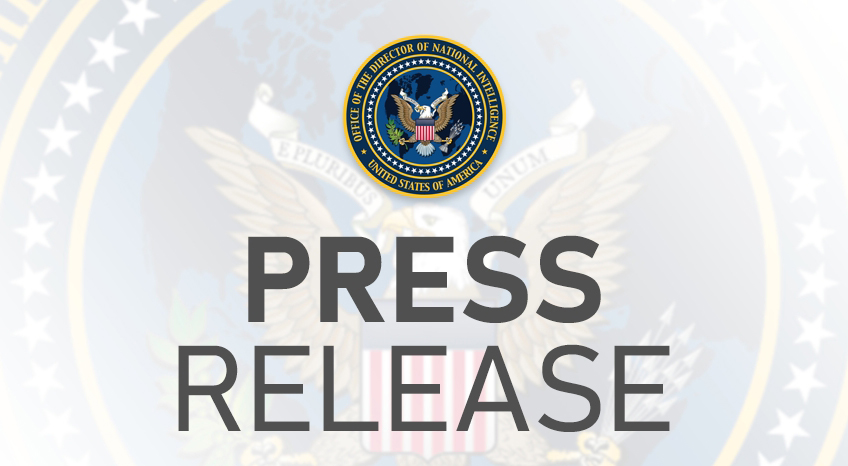Statement by NCSC Director William Evanina: Election Threat Update for the American Public

On July 24, 2020, I issued a statement to the American public providing an unclassified overview of foreign threats to the 2020 election and offering basic steps to mitigate some of these threats. At that time, I pledged that the U.S. Intelligence Community (IC) would continue to update the American public and other key stakeholders on the evolving election threat landscape, while also safeguarding our intelligence sources and methods.
Today, we are making good on that promise by sharing additional information with the public on the intentions and activities of our adversaries with respect to the 2020 election. This information is being released for the purpose of better informing Americans so they can play a critical role in safeguarding our election. Below is the latest public update:
Ahead of the 2020 U.S. elections, foreign states will continue to use covert and overt influence measures in their attempts to sway U.S. voters’ preferences and perspectives, shift U.S. policies, increase discord in the United States, and undermine the American people’s confidence in our democratic process. They may also seek to compromise our election infrastructure for a range of possible purposes, such as interfering with the voting process, stealing sensitive data, or calling into question the validity of the election results. However, it would be difficult for our adversaries to interfere with or manipulate voting results at scale.
Many foreign actors have a preference for who wins the election, which they express through a range of overt and private statements; covert influence efforts are rarer. We are primarily concerned about the ongoing and potential activity by China, Russia, and Iran.
- CHINA – We assess that China prefers that President Trump – whom Beijing sees as unpredictable – does not win reelection. China has been expanding its influence efforts ahead of November 2020 to shape the policy environment in the United States, pressure political figures it views as opposed to China’s interests, and deflect and counter criticism of China. Although China will continue to weigh the risks and benefits of aggressive action, its public rhetoric over the past few months has grown increasingly critical of the current Administration’s COVID-19 response, closure of China’s Houston Consulate, and actions on other issues. For example, it has harshly criticized the Administration’s statements and actions on Hong Kong, TikTok, the legal status of the South China Sea, and China’s efforts to dominate the 5G market. Beijing recognizes that all of these efforts might affect the presidential race.
- RUSSIA – We assess that Russia is using a range of measures to primarily denigrate former Vice President Biden and what it sees as an anti-Russia “establishment.” This is consistent with Moscow’s public criticism of him when he was Vice President for his role in the Obama Administration’s policies on Ukraine and its support for the anti-Putin opposition inside Russia. For example, pro-Russia Ukrainian parliamentarian Andriy Derkach is spreading claims about corruption – including through publicizing leaked phone calls – to undermine former Vice President Biden’s candidacy and the Democratic Party. Some Kremlin-linked actors are also seeking to boost President Trump’s candidacy on social media and Russian television.
- IRAN – We assess that Iran seeks to undermine U.S. democratic institutions, President Trump, and to divide the country in advance of the 2020 elections. Iran’s efforts along these lines probably will focus on on-line influence, such as spreading disinformation on social media and recirculating anti-U.S. content. Tehran’s motivation to conduct such activities is, in part, driven by a perception that President Trump’s reelection would result in a continuation of U.S. pressure on Iran in an effort to foment regime change.
The intelligence assessments above represent the most current, accurate, and objective election threat information the IC has to offer in an unclassified setting at this time. Providing objective intelligence analysis is the solemn duty of the men and women of the IC, who work day and night around the world, often at great personal risk, to safeguard our nation.
The IC also recognizes there will continue to be demand for more information as the election approaches. The IC has and will continue to provide classified election threat briefings to the presidential campaigns, political committees and all Members of Congress. We have provided nearly 20 classified election threat briefings to these stakeholders since mid-May 2020. We will also keep providing updates to the American public, consistent with our national security obligations. The steps we have taken thus far to inform the public and other stakeholders on election threats are unprecedented for the IC.
Aside from sharing information, let me assure you that the IC is also doing everything in its power to combat both cyber and influence efforts targeting our electoral process and continues to support DHS and FBI in their critical roles safeguarding the election. As I emphasized in my July 24, 2020 public statement, we are all in this together as Americans. Our election should be our own. Foreign efforts to influence or interfere with our elections are a direct threat to the fabric of our democracy. For more information on election participation, understanding foreign influence and disinformation, and ways in which the U.S. Government is working to secure the 2020 election, we encourage Americans to visit the following websites:
- DHS Election Security: https://www.dhs.gov/topic/election-security
- DHS/CISA #Protect2020: https://www.cisa.gov/protect2020
- FBI Protected Voices: https://www.fbi.gov/investigate/counterintelligence/foreign-influence/protected-voices
- National Association of Secretaries of State #TrustedInfo2020: https://www.nass.org/initiatives/trustedinfo-2020